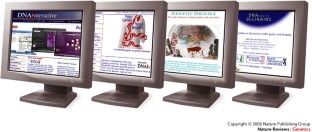Abstract
Genetics education is essential for preparing the public to engage in an informed debate about the future of genetics research and how its applications affect human health and the environment. This article provides an overview of genetics education resources that are available online, and is relevant to students in secondary education, health professionals, geneticists and the public. It also describes an integrated approach to teaching genetics, emphasizes the need for continuing teacher education, and encourages the involvement of geneticists and health professionals in providing a teaching resource.
This is a preview of subscription content, access via your institution
Access options
Subscribe to this journal
Receive 12 print issues and online access
$189.00 per year
only $15.75 per issue
Buy this article
- Purchase on Springer Link
- Instant access to full article PDF
Prices may be subject to local taxes which are calculated during checkout

References
Mesters, I., Ausems, A. & De Vries, H. General public's knowledge, interest and information needs related to genetic cancer: an exploratory study. Eur. J. Cancer Prev. 14, 69–75 (2005).
Lanie, A. D. et al. Exploring the public understanding of basic genetic concepts. J. Genet. Couns. 13, 305–320 (2004).
People Science & Policy Ltd. The Supply of Genetic Tests Direct to the Public — Supporting the Public Consultation. Human Genetics Commission [online], http://www.hgc.gov.uk/UploadDocs/DocPub/Document/evidence_focusgroup.pdf> (2002).
Sanderson, S. C., Wardle, J., Jarvis, M. J. & Humphries, S. E. Public interest in genetic testing for susceptibility to heart disease and cancer: a population-based survey in the UK. Prevent. Med. 39, 458–464 (2004).
Catz, D. S. et al. Attitudes about genetics in underserved, culturally diverse populations. Comm. Genet. 8, 161–172 (2005).
Rose, A., Peters, N., Shea, J. A. & Armstrong, K. The association between knowledge and attitudes about genetic testing for cancer risk in the United States. J. Health Commun. 10, 309–321 (2005).
Taking Our Pulse: The PARADE/Research!America Health Poll Charlton Research Company. Genetics and Personalized Medicine. Research!America [online], <http://www.researchamerica.org/polldata/parade/practicalguide_files/frame.htm>(2004).
National Centre for Social Research. What do people think about gene therapy? Wellcome Trust [online], <http://www.wellcome.ac.uk/doc_WTX026422.html> (2005).
National Assessment of Education Progress. Science 2000 Major Results. National Center for Education Statistics [online], <http://nces.ed.gov/nationsreportcard/science/results/> (2000).
Hayflick, A. F. J., Eiff, M. P., Carpentar, L. & Steinberger, J. Primary care physicians' utilization and perceptions of genetics services. Genet. Med. 1, 13–18 (1998).
Metcalfe, S., Hurworth, R., Newstead, J. & Robins, R. Needs assessment study of genetics education for general practitioners in Australia. Genet. Med. 4, 71–77 (2002).
Hunter, A., Wright, P., Cappelli, M., Kasaboski, A. & Surh, L. Physician knowledge and attitudes towards molecular genetic (DNA) testing of their patients. Clin. Genet. 53, 447–455 (1998).
Wilkins-Haug, L., Hill, L. D., Power, M. L., Holzman, G. B. & Schulkin, J. Gynecologists' training, knowledge, and experiences in genetics: a survey. Obstet. Gynecol. 95, 421–424 (2000).
Munn, M., Skinner, P. O., Conn, L., Horsma, G. & Gregory, P. The involvement of genome researchers in high school education. Genome Res. 9, 597–607 (1999).
Clark, M. A successful university school district partnership to help San Francisco's K-12 students learn about science and medicine. Academic Med. 71, 950–956 (1996).
Peplow, M. Science education: doing it for the kids. Nature 430, 286–287 (2004).
Singer, S. R., Hilton, M. L. & Schweingruber, H. A. (eds) National Research Council Committee on High School Science Laboratories: Role and Vision. America's Lab Report: Investigations in High School Science (National Academies Press, Washington DC, 2005).
Moore, A. Breathing new life into the biology classroom. EMBO Rep. 4, 744–746 (2003).
Trumbo, S. Introducing students to the genetic information age. Am. Bio. Teach. 62, 259–261 (2000).
Emery, J., Kumar, S. & Smith, H. Patient understanding of genetic principles and their expectations of genetic services within the NHS: a qualitative study. Comm. Genet. 1, 78–83 (1998).
Campbell, A. M. Public access for teaching genomics, proteomics, and bioinformatics. Cell Biol. Ed. 2, 98–111 (2003).
Ares, M. Interdisciplinary research and the undergraduate biology student. Nature Struct. Mol. Biol. 11, 1170–1172 (2004).
Bialek, W. & Botstein, D. Introductory science and mathematics education for 21st-century biologists. Science 303, 788–790 (2004).
Acknowledgements
The author would like to thank J. McInerney and D. Micklos for their assistance in preparation of this manuscript.
Author information
Authors and Affiliations
Ethics declarations
Competing interests
The author declares no competing financial interests.
Related links
Related links
FURTHER INFORMATION
Bioinformatics and the Human Genome Project
Exploring Our Molecular Selves
Genetic Science Learning Center
Genetics Education and Community Interactions
Genetics Education and Health Research Unit of the Murdoch Children's Research Institute
Genetics Education Partnership at the University of Washington
Genome Programs of the US Department of Energy Office of Science
Human Genetic Variation curriculum supplement
Innovative Scheme for Post-Docs in Research and Education
Mapping and Sequencing the Human Genome — Science, Ethics, and Public Policy
National Center for Biotechnology Information
National Coalition for Health Professional Education in Genetics
National Genetics Education and Development Centre
National Human Genome Research Institute
North West Genetics Knowledge Park
Online courses at the American Museum of Natural History
Online Mendelian Inheritance in Man
Resources for Involving Scientists in Education
Roche Genetics Education Program CD-ROM
Science & Health Education Partnership
The Biotechnology Explorer Programme
The Human Genome Project — Biology, Computers, and Privacy
The Puzzle of Inheritance: Genetics and the Methods of Science
Rights and permissions
About this article
Cite this article
Haga, S. Teaching resources for genetics. Nat Rev Genet 7, 223–229 (2006). https://doi.org/10.1038/nrg1803
Published:
Issue Date:
DOI: https://doi.org/10.1038/nrg1803
This article is cited by
-
Teacher Implementation and the Impact of Game-Based Science Curriculum Materials
Journal of Science Education and Technology (2018)
-
High School Biology/Life Science Teachers’ Presentation of Genetic Counseling and Health Care Career Options in Their Classrooms
Journal of Genetic Counseling (2009)
-
Defining the spectrum of genome policy
Nature Reviews Genetics (2006)
